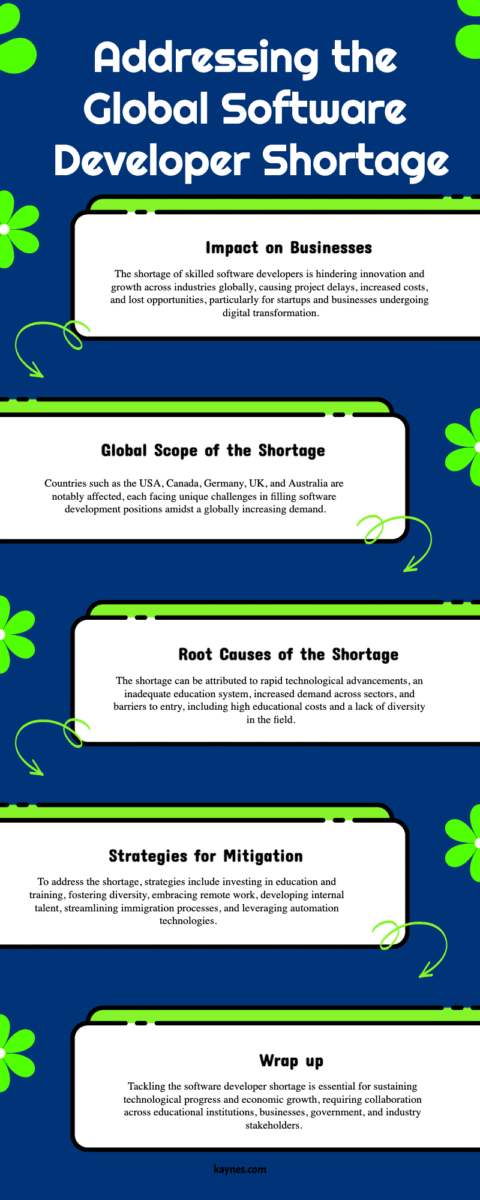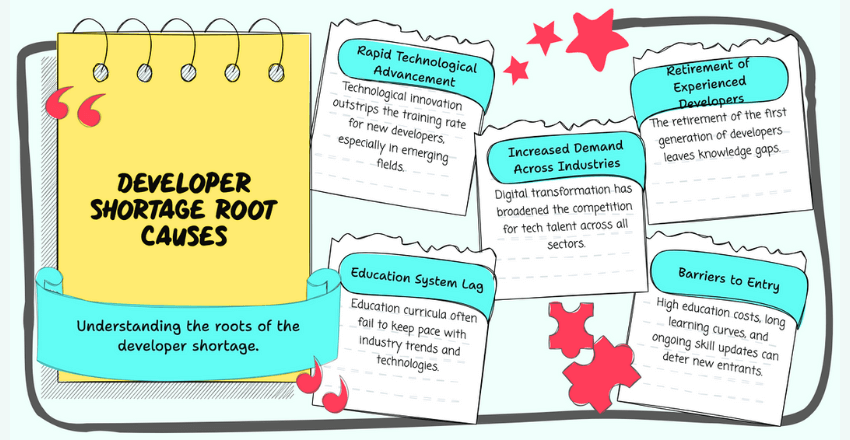
Addressing Today’s Software Developer Shortage
Every innovative enterprise, from quick-moving startups to established corporations, are caught in the same predicament: there’s just never enough skilled software developers to go around.
Thank you for reading this post, don't forget to subscribe!I’ve seen the suffocating effects of this shortage firsthand – delayed projects, skyrocketing costs, and missed opportunities that leave businesses gasping for technological breath.
But wait, there’s light at the end of this tunnel: With years of experience under my belt, I’ve witnessed how a multifaceted approach – encompassing effective education, inclusive immigration policies, and proactive industry initiatives – can help alleviate this crisis.
The tech industry is facing a critical challenge: a severe shortage of skilled software developers. This scarcity is impacting businesses across the globe, hindering innovation and growth. But why is this happening, and what can be done about it?

Companies are struggling to find qualified software engineers to meet their growing technological needs. This shortage is causing project delays, increased costs, and lost opportunities for businesses of all sizes.
The consequences of this shortage are far-reaching. Startups are unable to launch their products on time, established companies are falling behind in digital transformation efforts, and entire economies are at risk of losing their competitive edge in the global market.
To address this crisis, we need a multi-faceted approach involving education, immigration policies, and industry initiatives.
The Global Impact of the Software Developer Shortage
The software developer shortage is not confined to a single country or region. It’s a global phenomenon affecting economies worldwide. Let’s take a closer look at the countries experiencing this shortage and the implications for the tech industry.
Countries with Software Engineer Shortage
The software engineer shortage is particularly acute in several countries, each facing unique challenges in meeting the demand for tech talent:
- United States: The USA is experiencing a significant shortage of software engineers, with tech hubs like Silicon Valley, Seattle, and New York feeling the pinch most acutely.
- Canada: Despite its strong tech sector, Canada is struggling to fill software development positions, especially in cities like Toronto and Vancouver.
- Germany: As Europe’s largest economy, Germany is facing a severe shortage of IT professionals, including software engineers.
- United Kingdom: Post-Brexit, the UK is grappling with a tech talent crunch, particularly in London’s thriving startup ecosystem.
- Australia: The island continent is experiencing a shortage of skilled software developers, impacting its growing tech industry.
These countries are not alone in their struggle to find qualified software engineers. The shortage is a global issue, affecting both developed and developing economies.
Is There a Shortage of Software Engineers? Reddit Weighs In
When it comes to understanding the real-world impact of the software developer shortage, online communities like Reddit offer valuable insights. A quick search on Reddit reveals numerous discussions about the software engineer shortage, with developers, recruiters, and hiring managers sharing their experiences.
Many Reddit users confirm the existence of a shortage, citing:
- Intense competition for senior-level developers
- Inflated salaries and aggressive recruiting tactics
- Difficulty in finding candidates with specific skill sets
- Long hiring processes and unfilled positions
However, some Redditors argue that the shortage is more nuanced:
- Entry-level positions are often overlooked
- Some geographic areas have an oversupply of junior developers
- Certain specializations (e.g., AI, cybersecurity) face more severe shortages than others
These diverse perspectives highlight the complexity of the software developer shortage and the need for targeted solutions.
Shortage of Software Engineers in USA
The United States, home to some of the world’s largest tech companies, is feeling the impact of the software developer shortage acutely. Here are some key facts about the shortage in the USA:
- Job openings: According to the U.S. Bureau of Labor Statistics, employment of software developers is projected to grow 25% from 2022 to 2032, much faster than the average for all occupations.
- Skills gap: Many U.S. companies report difficulty in finding candidates with the right mix of technical and soft skills.
- Education pipeline: American universities are not producing enough computer science graduates to meet the demand.
- Immigration challenges: Restrictions on H-1B visas have made it harder for U.S. companies to recruit foreign talent.
- Regional disparities: While tech hubs like Silicon Valley face intense competition for talent, other regions struggle to attract and retain software developers.
The shortage in the USA is not just a problem for tech giants; it’s affecting businesses of all sizes across various industries, from healthcare to finance to manufacturing.
Root Causes of the Software Developer Shortage

To effectively address the software developer shortage, we need to understand its underlying causes. Let’s explore the factors contributing to this global talent crunch:
Rapid technological advancement
The pace of technological innovation is outstripping the rate at which we can train new software developers. Emerging fields like artificial intelligence, blockchain, and the Internet of Things require specialized skills that take time to develop.
Education system lag
Many educational institutions are struggling to keep their curricula up-to-date with the latest industry trends and technologies. This results in a gap between what students learn and what employers need.
Increased demand across industries
As digital transformation sweeps across all sectors, companies that traditionally didn’t need software developers are now competing for tech talent. This has dramatically expanded the pool of employers seeking software engineers.
Retirement of experienced developers
The first generation of software developers is reaching retirement age, creating a knowledge gap that’s difficult to fill quickly.
Barriers to entry
Despite the high demand, entering the field of software development can be challenging. High education costs, lengthy learning curves, and the need for continuous skill updates can deter potential candidates.
Lack of diversity
The tech industry’s historical lack of diversity has limited the potential talent pool. Efforts to attract more women and underrepresented minorities to software development careers are still catching up.
Understanding these root causes is crucial for developing effective strategies to address the software developer shortage.
Strategies to Address the Software Developer Shortage
Now that we’ve examined the extent and causes of the software developer shortage, let’s explore some practical solutions to bridge the gap between supply and demand:
| Category | Action Items |
|---|---|
| Invest in education and training | – Modernize computer science curricula in schools and universities |
| – Promote coding bootcamps and alternative education pathways | |
| – Encourage lifelong learning and continuous skill development | |
| Foster diversity and inclusion | – Implement programs to attract and retain underrepresented groups in tech |
| – Create inclusive work environments that support diverse talent | |
| – Partner with organizations focused on diversity in tech | |
| Embrace remote work | – Expand talent pools by hiring developers from different geographic regions |
| – Implement effective remote work policies and tools | |
| – Build a strong remote company culture to attract and retain talent | |
| Develop internal talent | – Implement mentorship programs and internal training initiatives |
| – Offer clear career progression paths for software developers | |
| – Encourage cross-training and skill development across departments | |
| Streamline immigration processes | – Advocate for policies that make it easier to hire international talent |
| – Simplify visa processes for highly skilled tech workers | |
| – Create programs to attract and retain foreign students studying computer science | |
| Leverage AI and automation | – Use AI-powered tools to automate routine coding tasks |
| – Implement low-code/no-code platforms to reduce the burden on skilled developers | |
| – Focus human talent on high-value, complex development tasks | |
| Collaborate with industry partners | – Form partnerships between businesses, educational institutions, and government agencies |
| – Create apprenticeship programs to bridge the gap between education and employment | |
| – Share resources and best practices for addressing the talent shortage |
With these strategies, we can work towards alleviating the software developer shortage and building a more robust, diverse, and sustainable tech workforce.
Wrapping up
The software developer shortage is a complex challenge that requires a multi-faceted approach. As we’ve explored in this article, the shortage is affecting countries worldwide, impacting businesses across industries, and hindering technological progress.
By understanding the root causes of this shortage and implementing targeted strategies, we can work towards closing the gap between supply and demand in the tech talent market. This will require collaboration between educational institutions, businesses, government agencies, and the developers themselves.
As we move forward, it’s crucial to remember that addressing the software developer shortage is not just about filling job openings. It’s about fostering innovation, driving economic growth, and shaping the future of technology. By investing in education, promoting diversity, embracing new work models, and leveraging emerging technologies, we can build a stronger, more resilient tech workforce capable of meeting the challenges of tomorrow.
The journey to addressing the software developer shortage may be long, but with collective effort and innovative thinking, we can turn this challenge into an opportunity for growth and progress in the global tech industry.
External Sources
Why there is developer shortage in the US inspite of layoffs?
byu/MissionNature8131 incscareerquestions
IsItBullshit: There are now too many software engineers.
byu/throw-away3105 inIsItBullshit


